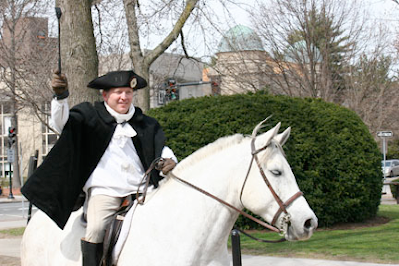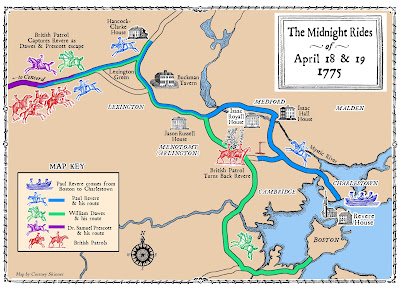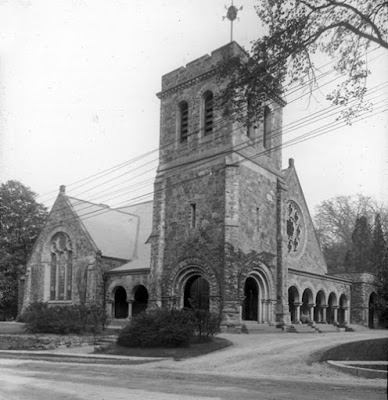 |
| April 18-19, 1775 |
April 18-19, 1775 - William Dawes rides through Brookline
April 22, 1861 - Brookline men and the Civil War
April 19, 1893 - Fourth building of First Parish dedicated
April 20, 1931 - Black protest at Longwood Towers
April 18-19, 1775
William Dawes rides through Brookline
William Dawes, who brought news that British troops were on their way from Boston to Lexington and Concord at the start of the Revolutionary War, passed through Brookline on his way. Dawes took the longer route (via Boston Neck and today's Coolidge Corner) while Paul Revere was rowed across the Charles River to Charlestown where he borrowed a horse for his more famous ride.
 |
| This map from the Paul Revere House shows the rides of Paul Revere (blue), William Dawes (green), and Samuel Prescott (purple). |
Dawes and Revere both made it to Lexington but were intercepted by a British patrol on the way to Concord. (Dawes escaped back to Lexington. Revere was held briefly and has his horse taken. A third man, Samuel Prescott, carried the news to Concord.)
Dawes' ride is recreated each year on Patriots Day, as shown above, stopping at the Devotion House. (The real Dawes did not stop.)
April 22, 1861
Brookline men and the Civil War
Ten days after the attack on Fort Sumter the men of Brookline gathered to sign their names on a document promising to "enroll themselves for the purpose of acquiring a knowledge of military drill and discipline, under the orders of the Military Committee of the Town."
When it came time for 24-year old Julius A. Phelps to sign he added, next to his signature, "Ready to go." The next man to sign added ditto marks next to his name, and several more townsmen followed Phelps' example, indicating they too were "Ready to go."
Fourteen months later Phelps was dead, one of the first of the Brookline men to give his life in defense of the Union. His name is one of 72 on the Civil War memorial installed in the old Town Hall in 1884 and now on display in the lobby of the current Town Hall.
 |
| A photograph of Julius Phelps published with those of other Brookline men killed in the Civil War |
April 19, 1893
Fourth building of First Parish dedicated
Brookline's oldest church, now known as First Parish, has had four different buildings since the first was constructed in 1717. The current building, now 130 years old, has lasted longer than any of its predecessors.
 |
| First Parish church. Lantern slide from the collection of the Brookline Historical Society |
The dedication of the building was attended by the leaders of all of the churches in the town, as well as members of the congregation and others from the broader Brookline community. Rev. Harold N. Brown, pastor of the church since 1873, was one of several who spoke.
"Dear friends, members of the church, and you who have shown your interest by being present on this occasion," he said, "whatever feelings of joy I may have as I look into the audience is tempered very strongly by the increased responsibility. What shall we do with this church? Tonight we dedicate, but in reality we consecrate it. The task of years is still before us. Let us hope by our prayers that the peace of God may come to all who worship here, and that this house may grow sacred and hallowed in days to come."
April 20, 1931
Black protest at Longwood Towers
Demonstrators picketed in front of the ballroom of the Longwood Towers on Chapel Street to protest the barring of five Black students and their escorts from a senior prom being held there by Girls High School in Roxbury.
Black and white protesters. mostly women, from the League of Struggle for Negro Rights1 joined the organization's head, John W. Youngblood, in picketing the residential hotel. They carried signs with such slogans as "Down with discrimination," and "They are in league with the lynchers in the South."
Youngblood and others thought the discrimination was instigated by several girls from the South on the prom committee. Three of the couples insisted on their rights and were eventually let in to the dance. The demonstration continued until broken up by Brookline police who tore up the picketers' signs and arrested one woman who refused to leave.
 |
| Boston Globe, April 21, 1931 |
1 The League of Struggle for Negro Rights was the civil rights organization of the American Communist Party. Langston Hughes was its honorary chair in the mid-1930s.

No comments:
Post a Comment